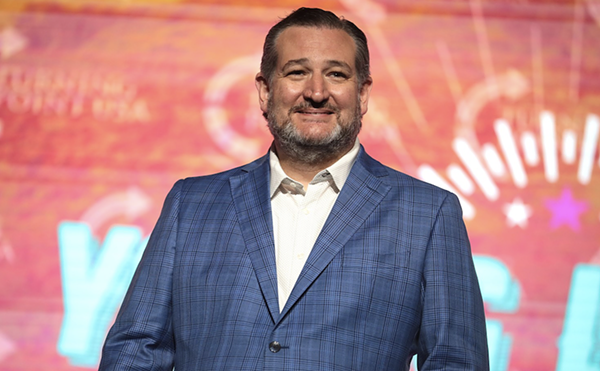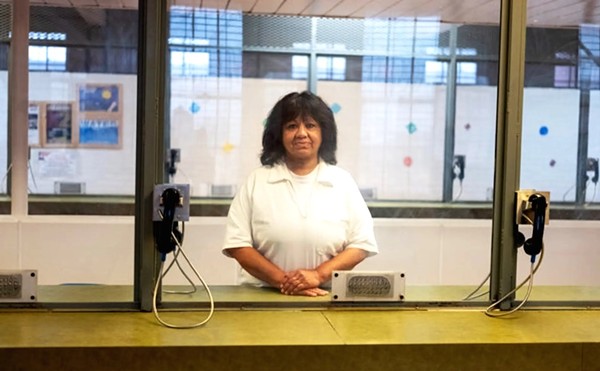| No crucifixes, headscarves, or yarmulkes: Jacques Chirac |
French President Jacques Chirac's controversial crusade to preserve French secular society seemed to be gaining momentum with last week's news that a prominent Egyptian Muslim cleric supported a proposed law forbidding the wearing of head scarves in school.
In early December, Chirac, who is facing increasing political challenges from the nationalist right in France, announced that he would seek a ban on any significant display of religious affiliation, which could be extended into the workplace as well as school. French Parliamentarians went one better, changing proposed language for the bill from "significant" to "visible," and polls suggest that a solid majority of the French public favors the law.
Critics who fear that this exercise of state power is the newest facet of France's marginalization of a growing Islamic minority weren't mollified that skull caps and crucifixes would also be outlawed. The goal, said Chirac, was to preserve the secular nature of the French republic; fans of the ban, including prominent French actresses and artists, say that the head scarf, or hajib, is a form of female subjugation that shouldn't be condoned by governmental institutions.
Across the Atlantic, American response in letters to the editor and on weblogs has been heated and representative of the ongoing conflict over religion in the American public school system. In Plano, Texas, an 8-year-old student at Thomas Elementary School was prevented from distributing candy canes attached with a fictional story about how the candy cane was invented to honor Jesus: It's an upside down J after all. The nonprofit Liberty Legal Institute has already threatened to sue the school district, which has a policy prohibiting students from distributing religious messages on school grounds.
According to widely accepted readings of U.S. constitutional law (Lemon v. Kurtzman and Santa Fe v. Doe), the student should be allowed to pass out his proselytizing candy, as long as there is no appearance of endorsement or coercion from the school. The constitutional defense organization, the Anti-Defamation League, argues, for instance, that a young girl who chooses to spend her recess discussing the Bible under a tree is free to do so, as long as other students don't have to participate. In fact, the courts have ruled, the school is infringing on the child's right of freedom of expression if it confiscates his canes or tells her what she may or may not talk about with her peers during her free time.
However, a school can't in any way promote a religion or engage in activities or speech that give the appearance of favoring one religious tradition over another. The holiday season always provides ample opportunity for stepping in it, as we say here in Texas, and San Antonio is no exception to the potential pitfalls.
A Jefferson High School choral concert on December 19 included the beautifully sung musical selections included "Joy to the World," and "Wash Me, Oh Lord"; a fall concert featured, "Good News, the Chariot's Coming." Yet there was no public outcry - just very impressed parents and community members (including neighborhood resident and Jefferson grad Mayor Ed Garza) who clapped their hands and shouted approval to the mariachi performance that punctuated the show.
This spring, Jefferson Theatre Arts Director Robert Rehm plans to produce the Andrew Lloyd Webber and Tim Rice musical, "Joseph and the Amazing Technicolor Dreamcoat," which first appeared in England in 1968. The story is based on an Old Testament biblical tale of a favorite son who is abused by his brothers, rises to prominence in Egypt, and in the end forgives all.
The musical never mentions a god by name. "It's presented as an historical story," says Rehm, who nonetheless was told by a previous principal that he couldn't produce the show. Jefferson's new principal, David Udovich, approved it, however. "There's such a fun display of musical styles throughout," Rehm enthuses, including country western, reggae and rock 'n' roll, allowing him to showcase some of the school's outstanding vocal talent.
The play also arguably has constitutionally permissible educational and historical value, coming out of a post-Vatican II era when popular culture began to question and reinterpret traditional Catholic dogma. And in the case of choral music, a majority of the potential material would be out the door if there could be no religious content.
Jefferson's Fine Arts Magnet program, and the holiday concert in particular, may demonstrate another way for Western democracies to deal with the contentious issue of religious tolerance in the public realm. If the arts in public schools are used as a means to explore a multitude of cultural expression and values, they may help our students to build and participate in a representative and tolerant society. •
The writer's child is enrolled in the Theatre Arts Program at Jefferson High School.

















